- Home
- Hugo Hamilton
Every Single Minute Page 2
Every Single Minute Read online
Page 2
In the square in front of the Brandenburg Gate there is some kind of demonstration going on. A small gathering of people with placards, more policemen than demonstrators. It’s all very calm, a lot of chanting, I think it’s for Tibet.
And Manfred is right, absolutely, she was like a mother. She gave advice like a mother, she asked questions like a mother, she bossed people around like a mother. You can’t have cake for your main meal, with beer. Eat something decent, Liam, look at you, the vultures would pass over you. That kind of thing she would say. As if she was responsible for me. But she would let you have anything you want after all, you could always get around her, and she insisted on paying for everything. She had a mother’s way of stepping into your life and giving a running commentary on everything that was going on, telling you what you were doing right or wrong while you were doing it. She cross-examined you like a mother, holding your arm and looking inside your head and saying out loud all the things you were keeping to yourself. She could guess what you were thinking. No wonder everyone thought she was my mother. She was like a mother to everyone. Indiscriminately. Even Manfred, the driver, she held his arm while he was helping her into the car, asking him questions until he told her that he was half-Turkish on his mother’s side and married with three children under ten. She said she was a hundred percent Irish and she would love to be half something else.
Maybe that’s what happens when you have no children of your own, you turn everyone else into children. She even spoke like a mother about Tibet.
God love them, she said, they only want to be themselves.
3
So we’re sitting side by side in the back of a large grey-coloured car and she’s telling me about the opera, Don Carlo. She’s saying it’s basically a big family story, not unlike her own. The conversation we have is quite random initially. She’s wondering about her dog. Will Buddy be all right, Liam, do you think? Yes, he’s perfectly happy, I assure her. She tells me to remind her about the sheets. The sheets, Liam, don’t let me forget the sheets. Because she has everything planned out in advance and it’s her intention to buy a new pair of sheets in Berlin to bring home with her to Dublin.
Manfred is taking us through the big park, past the golden angel, it’s been seen in lots of movies, and music videos. The day is sunny and there are people out walking with take-away coffees. Running with bottles of water. And dogs. Running with dogs. Cycling with dogs. Look at that, she says, pointing to a man cycling with a child inside a trailer cart attached to the back of his bicycle. Or is it two children? That’s not something you see very much of in Dublin, she says. She talks about the amount of women on bicycles without helmets. Right out in the middle of the traffic. She says you wouldn’t find her cycling without a helmet in any city now. We come out of the park and pass by a large yellow brick building in a modern design that looks like a pirate’s hat, she says. It’s the Berlin Philharmonic. Another place she would love to include on the list.
Then she tells me why she loves Don Carlo.
The plot is a bit complicated, from what I remember. It’s about a father killing his own son. The King is forced to hand over his son in order to keep his reign, that’s the outline in a simple sentence. It’s set in Spain during the Spanish Inquisition. The King is trying to bring order to the world by force and his son Don Carlos is against all that brutality, he wants to stop the killing and everyone to go home and live in peace with the person they love. Power is all that matters to the King. He’s addicted to power and he’s got to do everything to keep it, including killing his own son. It’s a terrible decision he has to make and he’s full of guilt and remorse, going against all his instincts as a father. There is an added problem. The son, Don Carlos, is in love with a French woman, but his father has already married her by force and made her the Queen. She still loves Don Carlos and Don Carlos is heartbroken. That gives his father a further reason for mistrusting his son and getting him out of the way. I know it sounds a bit simplistic, but that’s it, more or less, a big family drama.
He must kill the love within himself, she says. The King has to kill the love inside in order to kill his own son.
The opera keeps reminding her of her own family, that’s why she’s so keen on seeing it again. It’s the story of every family, she tells me. That’s why Don Carlo has remained so popular over the years, because we can all read our own lives into the story, it’s universal. Every time she goes to see it she cannot help thinking of her own father and what happened to her brother, her little brother. It’s the power of the drama that makes you think it’s your own story which is being portrayed on stage, she says, you become part of what’s happening right in front of your eyes. She says her imagination is too big. She’s like a girl again, watching the story of her family unfolding around her. She’s so taken by the opera each time that she can see her brother coming back to life on stage. Her father killing the love inside himself. Her brother being taken away in the end. And she’s completely helpless, trapped in her seat, listening to the music. There’s nothing she can do to intervene.
We used to go to the theatre together, the odd time in Dublin. She would be given complimentary tickets and ask me to go with her, as a companion. We would have an early meal somewhere and get to the theatre with time to spare so she could meet people. You could see them nudging each other, the lips moving. She would disappear into the crowd, pulled along by one handshake after another, passed on from one group to the next, until she needed to escape. Just when they were beginning to tell her something about herself that she already knew, she would point to me standing at the bar and tell them that she had somebody waiting for her. All these theatregoers she knew, I wouldn’t have a clue who they were, other writers, journalists, TV personalities, faces that everybody knows. What I remember most is people coming up to her at the interval saying they had read her book. And she would hunch up with all that praise, like a light was hurting her eyes. A woman once turned around and stood right up in her seat and reached back across two rows to shake her hand and say thank you. That’s all the woman said to her, thanks, for being so honest, for being herself, for writing the story of her life and her family without hiding anything.
It was mostly families we talked about in Berlin. We talked about Don Carlo and fathers and mothers and brothers. We talked about men and women and aunts and uncles and children and Jesuits and love and weddings and life and friends and lovers, the whole lot, I suppose. The things that happen in families. Which includes almost everything, doesn’t it? We were going around the city looking at the sights and telling each other these stories. Family stories and love stories come right and wrong, she said.
Is love still a good word for love, she asked me at one point. I mean, how can you answer that? Of course it’s still a good word. It’s the best word there is for love. What other word is there that would work any better? Chemistry? She said they were always making young words out of the old words, changing the meaning so you don’t recognize them any more. And love is one of those words like home and hope and passion, all those words that people never put back in the right place, she said.
I think being away in Berlin allowed us both to be quite open with each other. It helped us to forget what was happening to her, it was all on hold. There was a comfort in not having to think about what was imminent, I suppose. As long as we kept moving and telling each other stories, as long as the streets were going by and we had all these family things to talk about. I think it was not having to explain anything that made it easier to explain everything, if you get me.
4
She’s on a lot of steroids to help with her breath-ing. She’s searching in her see-through bag and takes out some medication. She reads the label and drops it back into the bag. She holds up the bag and looks inside. Because it’s easier to find things like that from the outside. She reaches in with her hand once more and takes out other medication, then looks at the label and drops that back into the bag also. It’s hard to know i
f she’s picking out the same one each time or if they’re always different.
She said your life is a pair of lungs. Time is a pair of lungs. Could that be right? You’re only as good as your lungs and her lungs had run out of time, something like that she said.
She described to me what it’s like going into hospital for a breathing test. The nurse gets you to sit down in front of a machine called the pulmonary function test. You put your lips around a nozzle that looks like a gum shield attached to the machine, then the nurse tells you to take in a deep breath until your lungs are completely full up and you hold it for as long as possible. Then you blow all the way out until your lungs are completely empty. And when you’re ready, she said the nurse says it all like a breathing song. Take in a deep breath, all the way in, right up to the top of your lungs and hold it, hold it, hold it, she says, hold it, hold it, very good, now blast all the way out, all the way, all the way, keep going, she says, all the way, all the way, all the way, keep going, every last bit, very good, excellent, well done, she says, until your face has gone all red from the effort and the nurse tells you to relax and breathe in normally and let’s try that again, one more time.
As well as the steroids, she’s also taking painkillers. And they’ve given her Xanax, too, so she can relax and sleep at night.
At the hotel she told me that she was afraid sometimes. I’m afraid of drowning, she said. I’m afraid my lungs will fill up and then I’ll drown. That’s what happens, you know, when you get pneumonia, it’s like drowning. I’m afraid of drowning alone, she said. The Xanax was meant to stop all that anxiety. She said it makes you more like yourself, back to the way you were before, the real yourself. Because she was worried, naturally, and she found it difficult to concentrate. Apart from a few articles in the newspapers, I think she had trouble absorbing too much news. She was more interested in seeing things first-hand now, listening to people. She couldn’t write. She didn’t see the point in putting things down any more. She had no time for things that were made up, she couldn’t read a novel or watch a movie, for example, there was no time for anything invented.
Only Don Carlo, because it was so personal to her.
She offers me a Xanax in the car, as if I need it. She starts laughing and shaking her see-through plastic bag around. Like she’s offering around mints or chocolate. Here, would anybody like a Xanax? Manfred ignores her. He’s in his own world and remains focused on the driving. Anyway it’s not something that should be given to a person operating machinery. I don’t need one either, but she says it will do me no harm, why not? So I take one for a laugh, see if it does anything for me.
I tell her that my daughter, Maeve, is getting married.
That’s great news, Liam.
She thinks I’m obsessed with my daughter. She doesn’t like me going on too much about Maeve all the time, I can understand that, because she has no children herself and this whole father and daughter thing gets to her a bit. I think it makes her feel excluded. She usually tells me to shut up. So I give her the details in brief, the wedding is planned for August.
That’s very soon, she says.
You’ll be getting an invitation, I tell her.
Thanks, she says.
And then I realize what I’ve just said. There’s not a hope in hell of her being able to attend the wedding. Maybe it’s the Xanax. It must be making me feel more like myself.
I’m coming, she says.
But it’s three months away.
I’ll be there, Liam. Whether I’m dead or alive. Where are they having it?
It seems like the future has abandoned her, all these things carrying on in her absence.
The wedding, Liam? Where are they having it?
On the farm, I tell her, his farm, Shane. It’s his mother and father, they’re very keen to have a wedding on the farm. They have these great barns and the ruins of an old church on their land. They want to have the wedding in the old ruins and then I suppose they’re intending to get a marquee, just in case of the weather. It’s a fully working farm, with live cattle and so forth. But knowing Shane, he will get that all fixed up, taking into account the wedding guests and their clothes and shoes, I would imagine. At least, that is what they’re talking about.
A farm wedding, she says. I would love to be there.
She once showed me a photograph of herself when she was the same age as Maeve. No more than twenty-four years old, twenty-five at the most. With lots of curls. It was taken before she went to London, before she worked as a chambermaid, when she was getting out, leaving her family and her country behind. With no fear and no idea what was coming. I wish I had met her then, the life in her. She must have been great fun in that photograph, full of danger and up for anything, all kinds of things not even thought up yet. The look in her eyes. Staring right at you. I think it was the eyebrows you noticed most. Striking, you would have to say, drawn by a child. Her eyes look like they had great questions to ask.
She has the same eyes in Berlin. They are the eyes of a twenty-four-year-old girl, with the eyebrows left intact, even though all her hair is gone from radiation and her lungs are working very hard and she can’t get enough air to say all the things she still wants to tell me.
She talks about a place she once went to which was great for the lungs. The salt mine she went to visit in Romania, in Transylvania. It was an active salt mine, fully operational, but all the people with bad lungs came there because the salt dried the air for them. That’s when she was travelling with Noleen. Herself and Noleen, they travelled all the way down from the Ukrainian border, right down to Tirana and back around the coast to Italy.
Lots of people told them to go to the salt mine. Patients with pulmonary trouble came from all over the country, all over the world in fact. People even asked them where they were from, as if they had come especially for their lungs, all the way from Ireland. She told them she had lungs like a damp cottage and they said she had come to the right place. It’s a famous mine, she says, like a place of pilgrimage without prayers, with the same air temperature day and night. She describes the trucks carrying out boulders of stone-white salt, and the people coming to inhale and straighten out their shoulders. Lots of people in wheelchairs. Grandmothers and all. Even people who were off the cigarettes having a cigarette, why not? Because the air was so clear it was crackling in your nostrils, she says. Whole families going for a picnic down there with fold-up chairs and a portable cassette player making hardly any noise because the place was so big. All the children breathing up and down and playing football in a huge underground stadium, she says. With floodlights. And goal posts marked out on the salt walls.
And after the salt mine, she’s telling me, they went swimming nearby in a salt lake that never freezes. It was the strangest feeling, she says. Floating on top of the water. Their legs were rising up out of the lake in front of them like buoyancy bags, you couldn’t keep them down. That’s what happens, your legs feel weightless, she says. And Noleen had a way of turning everything that went wrong into something to laugh at. When they were coming out of the lake they must have chosen a spot that was very muddy, because they were covered in mud like female wrestlers, the two of them laughing and holding on to each other, hardly able to stand up.
Travelling unlimited, she says.
She says her lungs are left in Romania. My lungs are in Romania, she says, and my head is in New York and my feet are in Berlin and the rest of me is in Dublin.
5
I heard her speaking a number of times in public. I saw her on stage once at the literary festival in Ennis, County Clare, in the Old Ground Hotel. I also saw her in Colorado, in Aspen. It was my first time in the Rocky Mountains, but they were very familiar to me already. I had a good memory of those mountains from watching television as a boy. I had also heard a lot of songs that were written about that part of America.
Some of the things she said in Ennis she also said in Aspen. She was there to speak about herself and her family. What life wa
s like for a Dublin woman in her own time. How things have changed and how much better things are now and how much has gone missing. She was well known for speaking straight from the heart, no matter where she was, Ennis or Aspen. She was the world expert on her own childhood and what happened inside her family, nobody could argue with her about those facts. People everywhere in Ennis and Aspen loved hearing what things were like in Ireland and why she could never forgive her mother and father.
The problem was that every time she spoke in public, she would get herself worked up, she got angry, she cried openly. People wanted to hear everything in person nowadays and that left her vulnerable, stepping back into her own childhood and remembering it all over again as if it happened only recently and it was never going to be over. Every time she spoke about these things in public she had to back them up emotionally, in tears, as if nobody would believe her unless she cried.
Sometimes I was afraid the story was getting magnified each time she told it. You know the way you remember things larger than they actually were, whenever you speak about them, just because somebody is good enough to listen. People in the audience were so enthusiastic, she may have been forced to make things look worse. Or maybe it was just a matter of finding the best words to describe the worst things. She had a good memory for bad memory, so she said herself.
Or does everything get smaller when you talk about it?

 Dublin Palms
Dublin Palms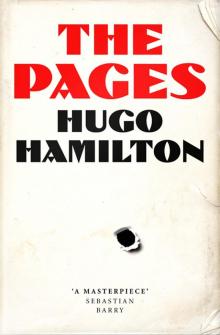 The Pages
The Pages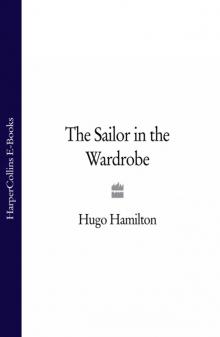 The Sailor in the Wardrobe
The Sailor in the Wardrobe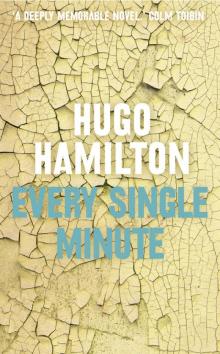 Every Single Minute
Every Single Minute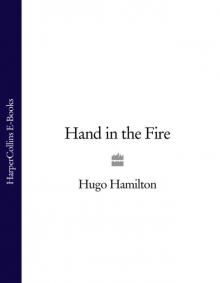 Hand in the Fire
Hand in the Fire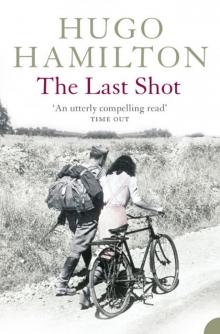 The Last Shot
The Last Shot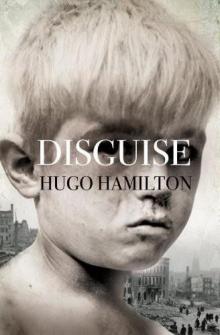 Disguise
Disguise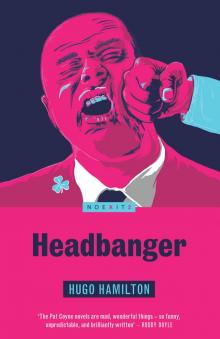 Headbanger
Headbanger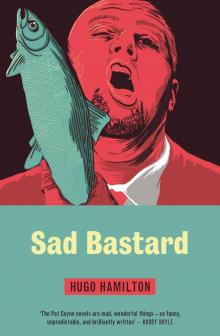 Sad Bastard
Sad Bastard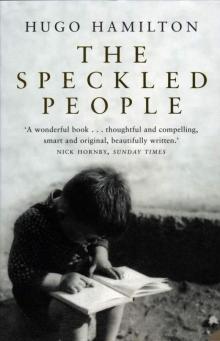 The Speckled People
The Speckled People